8 Highest-Quality Eggs on Grocery Shelves

Food trends come and go, but eggs have continued to reign as a main breakfast staple. Packed with protein, these versatile and affordable foods are chock-full of important nutrients, including protein, iodine, vitamin B12, and choline, a nutrient that may help support memory. But choosing the best eggs isn't as simple as it used to be.
Today's grocery shelves are filled with labels like "organic," "free-range," "cage-free," and "pasture-raised," leaving many shoppers unsure of what these terms actually mean. While all eggs provide important nutrients, some varieties—like organic or pasture-raised—offer added features that align with specific health, environmental, or ethical priorities.
To help you navigate the options, we've rounded up eight of the best egg brands that are high-quality and absolutely delish!
In This Article
The 8 Best Egg Brands
Vital Farms Pasture Raised-Eggs
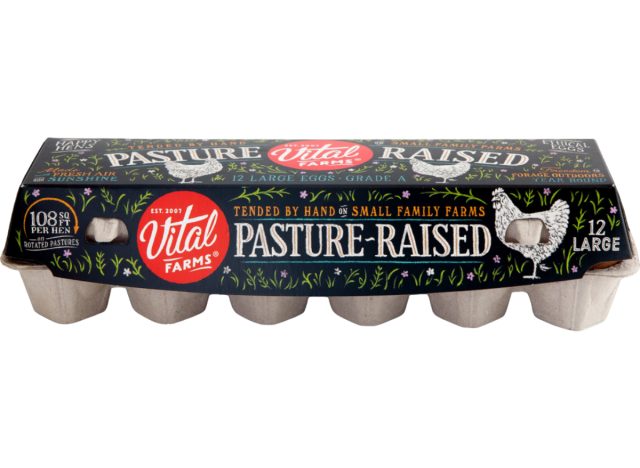
Calories: 70
Fat: 5 g (Saturated Fat: 1.5 g)
Sodium: 70 mg
Carbohydrates: 0 g (Fiber: 0 g, Sugar: 0 g)
Protein: 6 g
Vital Farms' logo is, well, pretty straightforward: "Keeping it bullsh*t-free." Vital Farms guarantees that their hens are treated ethically and given plenty of space to roam—eggs simply taste better without abuse. Vital Farms' Pasture-Raised Eggs come in both regular and extra-large varieties (as well as organic) and boast deliciously golden yolks with six grams of protein per egg to keep you full and energized.
Eggland's Best Classic Large White Eggs
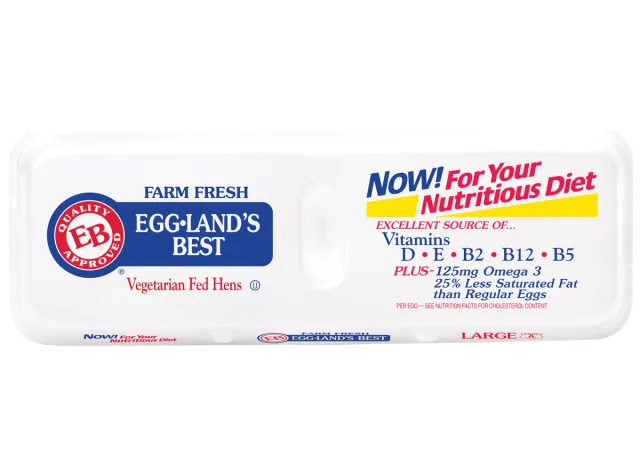
Calories: 60
Fat: 4 g (Saturated Fat: 1 g)
Sodium: 65 mg
Carbohydrates: 0 g (Fiber: 0 g, Sugar: 0 g)
Protein: 6 g
Eggland's Best Eggs are unique because they contain 25% less saturated fat, six times more vitamin D, and 10 times more vitamin E than ordinary eggs. Plus, they contain more than double the omega-3 fatty acids vs ordinary eggs. They also stay fresher longer than ordinary eggs, which may help reduce food waste.
Organic Valley Pasture Raised Large Eggs
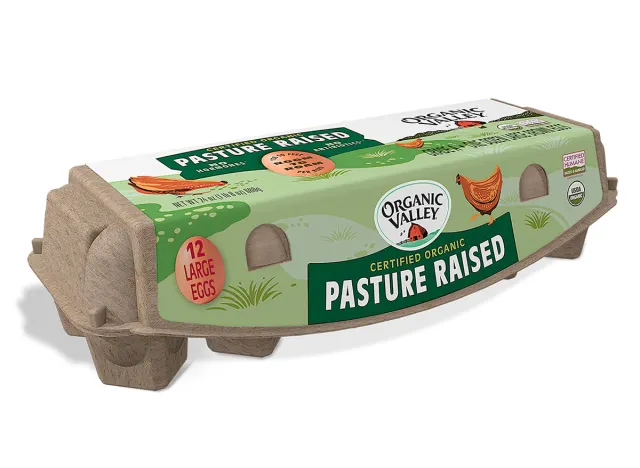
Calories: 70
Fat: 5 g (Saturated Fat: 1.5 g)
Sodium: 70 mg
Carbohydrates: 0 g (Fiber: 0 g, Sugar: 0 g)
Protein: 6 g
Organic Valley is known not only for its delicious dairy products but also for the company's USDA-certified organic eggs. These hens produce such delicious eggs due to their varied diet, as they're allowed to scratch and roost for grubs and grit instead of living their lives without ever touching the soil. Organic Valley Pasture Raised Large Eggs also provide 6% of your daily vitamin D as well as necessary potassium and iron to help fill any nutritional gaps.
Pete and Gerry's Organic Eggs
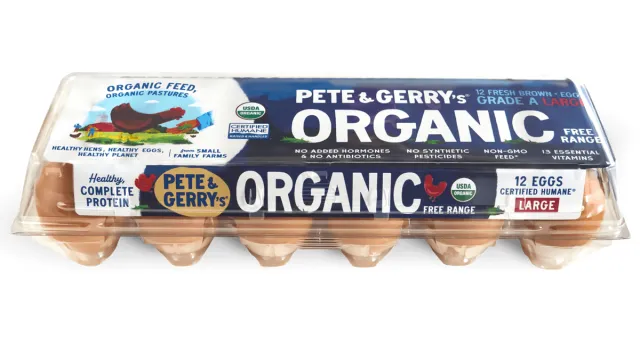
Calories: 70
Fat: 5 g (Saturated Fat: 1.5 g)
Sodium: 70 mg
Carbohydrates: 0 g (Fiber: 0 g, Sugar: 0 g)
Protein: 6 g
These USDA Certified Organic eggs are lare laid by Certified Humane Free-Range hens that forage and socialize outside. Pete & Gerry's eggs are produced by small family farms that never use synthetic pesticides.
Happy Egg Co. Heritage Free Range

Calories: 70
Fat: 5 g (Saturated Fat: 1.5 g)
Sodium: 70 mg
Carbohydrates: 0 g (Fiber: 0 g, Sugar: 0 g)
Protein: 5 g
With deep amber yolks, Happy Egg Co.'s Heritage Free Range Eggs are nothing short of gourmet. There's a reason that Michelin-star chefs love eggs laid by Hölzl Blue and Hölzl Brown hens – the taste is full and rich, and the egg whites are far from watery. These free-range eggs are also beautiful, coming in both brown and blue varieties within Happy Egg's biodegradable carton.
For a big nutrition boost, Happy Egg Co. also offers their Vitamin Plus carton, which is full of 12 eggs from free-range hens given an enriched feed with vitamins and nutrients. This feed results in eggs with 10 times the amount of vitamin D and two times the amount of vitamins B7 and B9 compared to standard eggs.
Alexandre Family Farm Large Pasture Raised Eggs
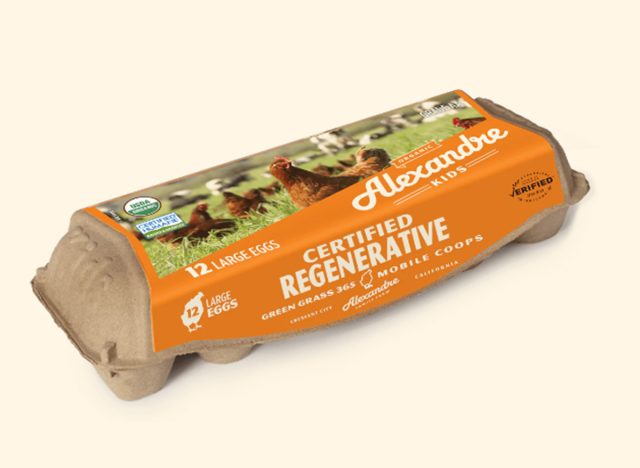
Calories: 91
Fat: 5.85 g (Saturated Fat: 1.95 g)
Sodium: 87.75 mg
Carbohydrates: 0.65 g (Fiber: 0 g, Sugar: 0 g)
Protein: 8.45 g
With a whopping 8.45 grams of protein per egg, Alexandre Family Farms eggs really up the ante. Alexandre Family Farm, known for its regenerative dairy farming practices, utilizes a mobile coop to raise healthy, ethical hens. All eggs are nest-laid and hand-gathered, both of which boost farmer-animal relationships and lower stress levels in the hens. And at the end of the day, these eggs are just plain delicious.
Utopihen Farms Large Organic Brown Eggs
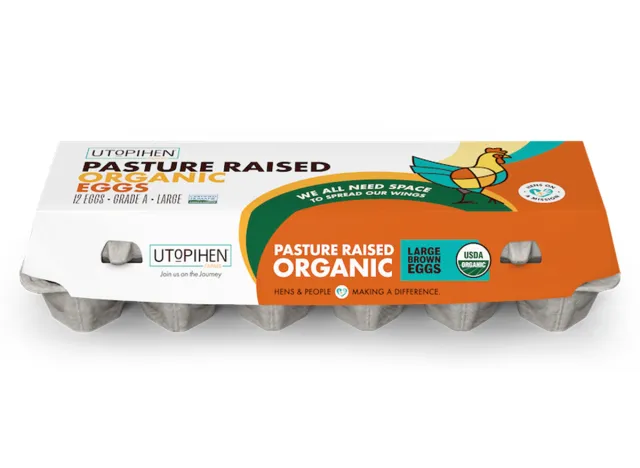
Calories: 70
Fat: 5 g (Saturated Fat: 1.5 g)
Sodium: 70 mg
Carbohydrates: 0 g (Fiber: 0 g, Sugar: 0 g)
Protein: 6 g
A utopia for hens? Yes, please! These USDA-certified organic eggs are fed a diet that is organic, non-GMO, and pesticide-free, and since all affiliated farms are also USDA-certified organic, there are no added antibiotics or hormones. According to Utopihen's website, these pasture-raised eggs have 25% less saturated fat, two times more omega-3 fatty acids, three times more vitamin D, and seven times more beta-carotene than conventionally grown eggs.
Farmers Hen House Eggs Pasture-Raised Eggs

Calories: 70
Fat: 5 g (Saturated Fat: 1.5 g)
Sodium: 70 mg
Carbohydrates: 0 g (Fiber: 0 g, Sugar: 0 g)
Protein: 6 g
These delicious brown eggs have beautiful golden yolks. With a minimum of 108 square feet of range area per hen, you only eat nutritionally dense eggs from nutritionally satisfied hens who have foraged widely to supplement their diets. As a plus, Farmers Hen House processes their eggs with 100% solar energy, so it's a win for you and the environment!
What Are the Different Types of Eggs?
In recent years, consumers have become ever more conscious of the ethics behind their food choices, and eggs are no exception. Options like pasture-raised, free-range, and organic have flooded grocery store shelves, but what does all of that mean?
- Pasture-raised eggs: These tend to be at a higher price point because the hens require more land. They are raised both indoors and outdoors on open pastureland.
- Cage-free eggs: Hens have larger enclosures compared to conventional systems, but they don't have outdoor access. This gives them more room to move, though the farmer can house fewer hens overall.
- USDA-certified organic eggs: These eggs come from hens fed a diet free of pesticides, hormones, and antibiotics.
Are Eggs Healthy?
Yes, eggs are a nutritious addition to a balanced diet. Eggs are good sources of protein, iodine, vitamin B12, and memory-boosting choline.
Most of an egg's nutrients are found in the yolk, so no matter the source of the egg you're eating, you're getting a decent nutrient boost.
The American Heart Association suggests that one egg (or two egg whites) are A-ok for healthy people who eat them as part of a healthy diet, it is nice to know that including an egg in your balanced diet is not only a delicious practice, but it also is unlikely to be detrimental to your heart health. (Note: the American Heart Association suggests that, generally, older adults with healthy cholesterol can have two eggs every day).









